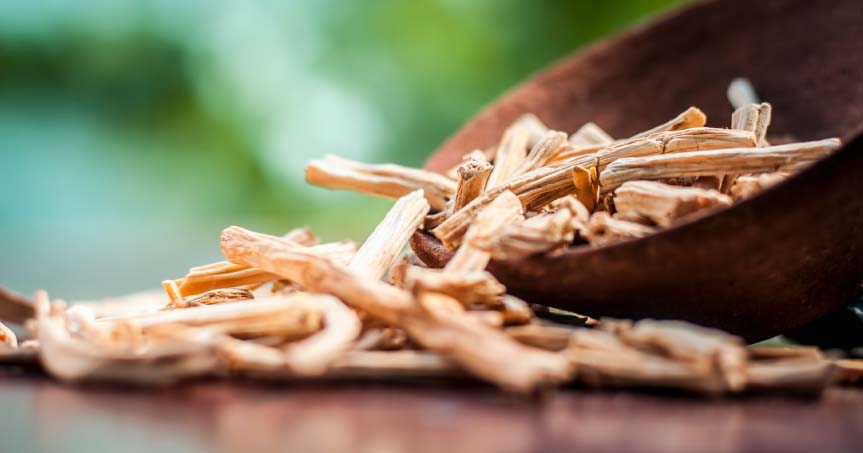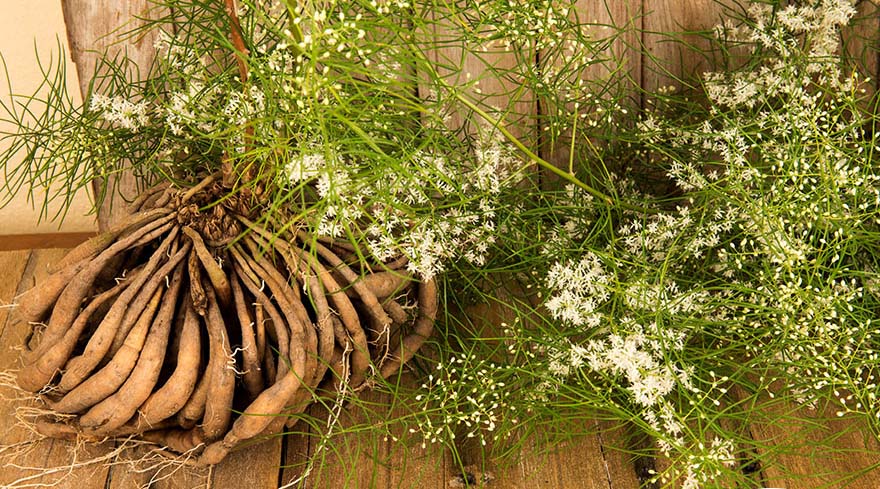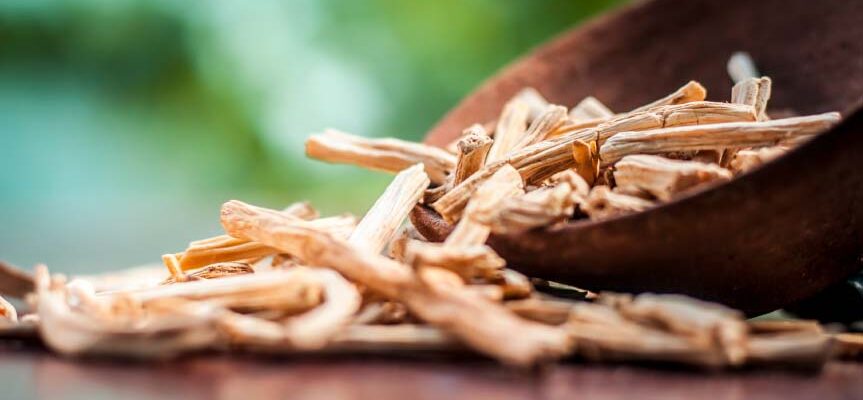Shatavari (Asparagus racemosus) is a herb generally used in traditional Ayurvedic medicine. It is particularly useful for women’s health. Shatavari has been used for centuries as an adaptogenic herb helping the body to cope with physical and emotional stress. There is a long list of Shatavari health benefits.
The herb acts as a general health tonic improving vitality making it a standard ayurvedic herb that supports:
- Reproductive health
- Balance hormones
- and promote overall well-being.

The herb has myriad other benefits. Let’s uncover the benefits of Shatavari for general health and women’s health alongside the various formulations and methods to consume the herb in various forms, and the recommended ways to take it.
Shatavari Health Benefits in Women’s Well-Being
Shatavari has antioxidant properties
Shtavari has shatavarin and other saponins with antioxidant ability to prevent cell damage due to free radical oxidation. It counters the oxidative stress leading to various chronic conditions. Shatavari contains a large amount of saponins.
A study in 2004 showed that a new antioxidant racemofuran was identified in the Shatavari root. Asparagamine A and racemosol were two other antioxidants, which were found.
Shatwar has anti-inflammatory properties
Racemofuran which is found in Shatavari has important anti-inflammatory properties. Some experts suggest that racemofuran has anti-inflammatory properties quite similar to COX-2 inhibitors.
Shatavar boosts the immune system
Shatavari is useful in Ayurveda as an immunity booster. An animal study in 2004 showed that treating with shatavari root extract had a higher number of antibodies in a strain of whooping cough rather than the untreated animals. The treated animals had a faster recovery rate with improved health which meant a better immune response.
Maybe Helpful In Relieving Cough
A study on the Shatavari root juice in the year 2000 on mice showed that Shatavari has antitussive or cough-relieving properties. Researchers used coughing mice to evaluate shatvari’s anti-cough properties. It was found that the Shatavari root extract stopped coughing and the need for codeine phosphate, prescription cough medicine.
Is Used to Help Treat Diarrhoea
Shatavari is a popular regional remedy for diarrhoea which can lead to serious issues like electrolyte imbalance and dehydration. A 2005 study with Shatavari showed that the herb dose helped resolve castor oil-induced diarrhea in rats. However, more studies in humans are needed to ascertain the property is helpful for humans as well.
Shatavari May Act as a Diuretic
Diuretics help relieve the body of excess fluid, whereby they help to remove excess fluid from the heart’s periphery in people with congestive heart failure. Prescription diuretics can lead to serious side effects.
A study in 2010 on rats indicated that Shatavari is useful as an Ayurveda diuretic. The study showed that 3,200 milligrams of shatavari had a diuretic activity which resolved the acute side effects. There is a need to study the effect on humans with more studies.
May be helpful in ulcer treatment
Ulcers occur in the form of sores in the stomach, small intestine, or esophagus. The ulcers can prove highly painful and may lead to further complications, like bleeding and perforation.
The 2005 study on rats showed that Shatavari helped create an effective treatment plan for medication-induced gastric ulcers.
Shatavari may help in kidney stone treatment
Kidney stones made from oxalates can lead to unbearable pain on passing through the urinary tract. These compounds are present in certain foods like spinach, beets, and french fries.
A 2005 study employed shatavari root extract to prevent oxalate stone formation in rats. Moreover, it also increased the magnesium concentration in urine. Optimum magnesium level in the body helps prevent the formation and growth of crystals in the urine leading to kidney stones.
Shatawar may help maintain blood sugar levels
Type 2 diabetes is increasing and there is a need for safer and highly effective treatment. A 2007 study on Shatavari showed that it helped maintain blood sugar levels. The compounds in the herb stimulate insulin production though in a certain unknown way.
However, further study is needed to confirm the same and make Shatavari a part of the treatments.
It may be anti-aging
Shatavari can also possibly have some of the most promising anti-aging properties. A 2015 study showed that saponins in shatavari root reduced the free-radical skin damage that caused wrinkles. Shatavari also prevented collagen breakdown helping to maintain the skin elasticity. Researchers consider shatavari as the future of safe and anti-aging skin care.
Shatavari may help to treat depression
Depression affects a huge part of the population. Many people cannot take prescription depression medications because of the negative side effects.
Shatavari is useful in Ayurveda for treating depression. A 2009 study on rodents revealed that Shatavari antioxidants had prominent antidepressant effects. It was seen that the antioxidants modified the neurotransmitters in the brain. And have a positive impact on brain biochemistry.
How to use Shatavari

For general well-being, Ayurveda specialists may recommend patients take 500 mg of Shatavari powder or tablet up to two times a day. This can also be in the form of 30 drops of Shatavari extract in juice or water thrice daily.
Shatavari isn’t well studied in humans. No standardized dose has been established. Additionally, to prevent kidney stones, literature suggests that Shatavari can be administered in the following forms:
- 4-5 milliliters of Shatavari root tincture, thrice daily
- Shatavari tea can be made using 1 teaspoon of powdered shatavari root boiled in 8 ounces of water to be taken twice daily.
It’s important to talk to a natural healthcare practitioner before incorporating shatavari into your routine, especially when you take medications or have health problems. It helps you to find the right dose for you.
Possible side effects and risks
Ayurvedic medicine considers it safe to use Shatavari in the long term like during pregnancy and lactation. However, there is still a need for scientific research and evidence on the benefits and possible side effects of Shatavari. Pregnant and lactating women need to consult a reputable and experienced Ayurveda specialist before consuming Shatavari.
Certain people get an allergic reaction after taking Shatavari. The allergic reaction symptoms of Shatavari can include
- Difficulty in breathing
- Dizziness
- Itchy eyes
- Itchy skin
- Fast heart rate
- Rash
Shatavari also produces diuresis and can enhance the action of other diuretics like furosemide (Lasix). So, avoid taking Shatavari if you are using this drug. It can also lower your blood sugar, so, avoid using it with other drugs lowering blood sugar.
Precautions for Using Shatavari in Women

Due to certain reports of allergies and side effects, there are certain considerations to keep in mind when using Shatavari. First of all, always take Shatavari after consulting with an experienced healthcare professional. This means the healthcare specialist would consider any underlying health conditions or medications you’re taking as of now. Key precautions include:
- Allergies: People who are allergic to asparagus may also be sensitive to Shatavari. Avoid shatavari if this is the case or take only under the able guidance of a natural healthcare practitioner.
- Breastfeeding: Shatavari is commonly used to support lactation and enhance milk production in breastfeeding women. However, it is recommended to consult a healthcare professional before using Shatavari while breastfeeding, due to the varying needs of individuals.
- Hormonal Imbalances: Shatavari can release phytoestrogens that can affect the punctuation of natural estrogen. Phytoestrogens are helpful in consciousness like breast cancer but can worsen conditions like uterine fibroids.
- Interactions with Medications: Shatavari can interact with several medications like antidiabetics, blood thinning, or hormone regulation pills. Make sure you consult with a doctor if you’re on such medication and want to take Shatavari.
- Dosage and Duration: The manufacturers will give the dosage of the Shatavari formulation or it should be mentioned by a healthcare professional. Do not take in excess if shatavari is the recommended dose.
- Quality and Sourcing: Always buy or source Shatavari from a reputable manufacturer known to provide quality herbal formulations ensuring purity standards are met. Check the quality standards on the label and also if it is tested for possible contaminants.
- Individual Variations: The effects of Shatavari may vary in every individual. It is necessary to start with a lower dose and observe your body’s response. If you feel allergies rashes or difficulty in breathing, discontinue the use.
It is most important to seek personalized advice from a healthcare expert before you begin to take any herbal remedy or supplement of Shatavari.
You May Also Like To Read:
Amla- Indian Gooseberry: 10 Physical Health Benefits, Uses, and Dosage
Osteopenia in Women – A Sweet Guide To Nutrition And Diet
Conclusion
Shatavari is a valuable herb giving multiple benefits for enhancing general well-being and women’s health. It may prove helpful in:
- Hormonal balance
- Support menstrual health
- Promote fertility and lactation.
Shatavari is widely used in traditional medicine. You can go for Shatavari powder, capsules, tinctures, or teas. Incorporating this herb into your wellness routine can provide a natural and holistic approach to improving women’s health. However, it is always advisable to consult with a healthcare professional before starting any new supplement to ensure it is suitable for your individual needs.
